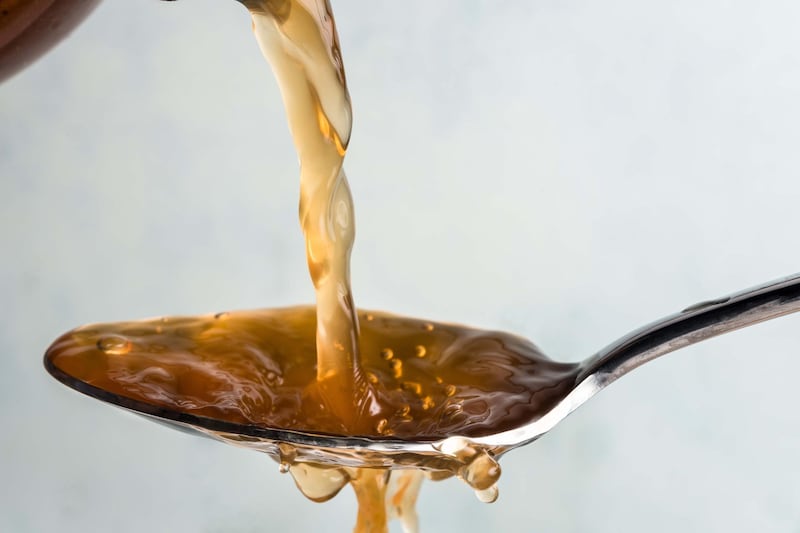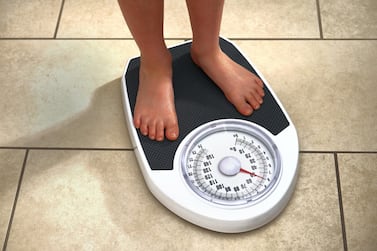When it comes to losing weight, there are all sorts of articles and books you can turn to for advice. But is it any good?
There’s a lot of money to be made in this industry, and, with that, plenty of suspicious advice has infiltrated the internet.
So The National turned to a few UAE experts to sort some of the facts from the fiction.
Fact or fiction? If I burn more calories and work out harder in the gym, then I can still eat what I want and lose weight.
“As exciting as that might sound, you can’t actually out-train a bad diet,” says Baraa El Sabbagh, a dietitian and personal trainer.
“The concept of calories in versus calories out is key in weight management, so as long as you’re eating fewer calories than you’re burning, you should be able to lose the weight.
“But if your food choices are unhealthy, this will eventually take a toll on your body. You’ll face poor digestion, fatigue, low energy and food cravings.”
You won’t actually see much progress with the exercise if you’re not choosing the right foods for adequate muscle building and recovery, either, she adds. “With time, this will lead to low compliance and failure in reaching weight loss goals.
“The most successful method to long-term weight loss is actually tapping into a mindset that will last a lifetime rather than trying to cheat the system.”
Fact or fiction? Adding cinnamon to my meals can boost my metabolism and therefore help me lose weight.
Nadine Aoun, a clinical dietitian at Medcare Women and Children Hospital, says there is some truth to this. “Scientists have found that an ingredient in cinnamon could help fat-burning in humans,” she explains.
“Cinnamaldehyde is an essential oil that helps give the spice its distinctive flavour and has been proven to protect mice against obesity in previous studies. Now, researchers at the University of Michigan have claimed the oil also activates thermogenesis, a metabolic bodily process that burns calories to produce heat.”
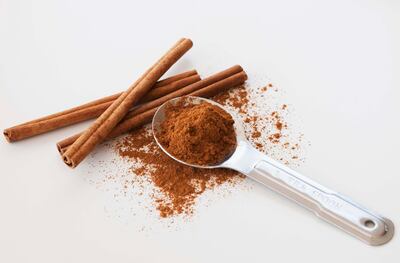
What that means is the process can actually help kick-start weight loss, although, of course, you can’t just depend on cinnamon in order to achieve your goals, Aoun warns.
Fact or fiction? Eating late at night or close to bedtime makes me put on weight.
The current research shows no physiological reason why eating before bed should cause weight gain, says Maria Abi Hanna, a clinical dietitian and eating disorders practitioner at Right Bite. "Many studies, though, do prove that people who eat at night are more likely to gain weight [for] several reasons."
For a start, people who eat later at night tend to emotionally eat, especially after a long day when they might be stressed out, bored or tired, she says.
“When we emotionally eat, we tend to make poor food choices and crave food that is high in salt, sugar or fat. It is usually common that we grab a chocolate bar, a bag of chips or order junk food after a hectic day at work, for example.
“Another reason why some people gain weight eating late at night is that they might not be eating enough during the day and, when we do that, we tend to overeat at night to compensate for the missed calories.”
There’s another downside to eating before bed, Hanna adds: “It may cause indigestion and reflux, especially when you eat big amounts close to bedtime.”
Fact or fiction? I should avoid carbohydrates in order to lose more weight.
Carbohydrates have often been demonised, but we do actually need them in our diet, says Maria Marlowe, a holistic nutritionist and author of The Real Food Grocery Guide. We do need to be mindful of which types of carbohydrates we're consuming, though, she adds.
“Healthy carbs include vegetables, fruit and whole grains. These can indeed be a part of a healthy diet and come packed with added fibre, nutrients and antioxidants.”
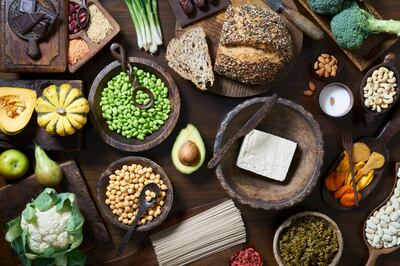
What we should be avoiding are refined carbs “such as bread, cereal, pasta and anything with refined sugar,” Marlowe explains. “Whenever grains are refined, they become [higher on the] higher glycemic [index] and lose much of their fibre and nutrition.” High glycemic foods, she explains, are associated with weight gain, while low glycemic foods are associated with weight loss. That’s because they contain carbohydrates that the body digests rapidly, causing blood sugar and insulin to surge and then dip.
“In the middle, there are starchy vegetables, like potatoes and corn. These are best consumed in moderation, because they have a high glycemic load.”
A cup of potatoes, she says, actually has a similar effect on blood sugar as a can of soda or a handful of jelly beans.
Fact or fiction? In order to lose weight, I have to go on a strict diet.
Jo Owen, a holistic health and nutrition coach, and founder of Nourish, Flourish and Fly, says yes and no. “Any ‘diet’ you commit to will work – no question of it – but if you don’t change your lifestyle and aim for long-term, sustainable approaches to your holistic health, success will be short-lived.”
She says we've been trying to control our eating habits in crazy ways for centuries. "In 1727, Thomas Short observed that fat people live near swamps. His treatise titled The Causes and Effects of Corpulence introduced the only logical weight loss tip he could deduce: move away from the swamp."
Owen says she’s tried low-fat, high-carb, cabbage soup and lean cuisine diets herself, until she realised she needed to take a more holistic approach. “People who go on a diet always see it as a fixed, finite thing – ‘I’m on a diet until I lose 10 or 20 pounds’.”
The word “diet” isn’t helpful, either, she adds. “[It] conjures up a restrictive ‘forbidden fruits’ mentality or a feeling of lack.” What happens is people try a diet for a certain amount of time, then go back to living exactly the way they were before, or even overdo it for a while due to the feeling of being restricted, and then end up right back where they started.
“A lifestyle change, on the other hand, means you commit to a lifelong way of eating and living that does you long-term good.
“I know it can seem impossible, because you’re still thinking about it as being on a ‘diet’ for the rest of your life, but it simply isn’t the same. A clean, whole foods approach to your nutrition doesn’t just affect your weight, it affects your entire life – it’s good for your physical, mental and emotional well-being.”
She suggests starting small. For instance, you could introduce a few new dishes into your repertoire at first and then gradually begin to crowd out unhealthy behaviours with healthy habits.
“You should be eating delicious meals every day, you should feel satisfied after eating them and your tummy should not be grumbling with hunger within a couple of hours – unlike with diets.”
Fact or fiction? Drinking more water helps you shed pounds.
Drinking water does indeed help boost your metabolism, says Hanna. It also cleanses your body of waste and toxins, and can act as an appetite suppressant as it takes up stomach space.

“Sometimes you may also mistake thirst for hunger and drinking a glass of water before reaching for something to eat can help to curb unnecessary snacking and manage cravings.
“Make sure you always stay well hydrated by drinking at least two litres of water a day.”
Fact or fiction? Drinking apple cider vinegar each morning helps me lose weight.
It may have a modest effect, says Aoun, but don't eschew your other exercise or healthy eating habits just yet. "A randomised, clinical trial recently published in the Journal of Functional Foods showed that apple cider vinegar might help with weight loss." Study participants drank 15 millilitres of the stuff – a total of two tablespoons – with lunch and dinner, and also ate a diet that was 250 calories less than their daily estimated requirements.
“The researchers found that apple cider vinegar significantly reduced weight.” Those taking it lost an average of about four kilograms over the 12-week study period, while those who didn’t only lost just over 2 kgs. Researchers argued the ingredient helped curb appetite, potentially leading to more weight loss.
Hanna says more studies need to be done to prove the impact, however. “Current research shows that apple cider vinegar promotes fullness, suppresses appetite and improves blood sugar and insulin response. For maximum benefit, it is recommended you mix about one to two tablespoons of apple cider vinegar with water per day.
"Though it has proven to have a positive impact, it is still not a magic formula and there are other factors to consider when it comes to successful weight loss.”
Fact or fiction? Fat makes you gain weight.
Just as we should be consuming healthy carbohydrates, we should also be consuming healthy fats, explains Marlowe in her book. “These support our health. We should avoid refined carbs and oils, which both wreak havoc on our health and waistline.”
Healthy fats are unrefined fats from nature, she says. They are found in foods such as olive oil, avocado, nuts and seeds. "These are the types of fats that are found in the Mediterranean diet, considered one of the healthiest ways of eating."
Unhealthy fats are generally refined and man-made. “During processing, refined oils – like canola, corn, soy, sunflower, safflower, cottonseed, peanut and vegetable oils – are heated to high temperatures and heavily processed, which causes the unsaturated fatty acids from the seeds to oxidise, creating by-products that are harmful to human health, including trans-fats, which spark inflammation, age us and contribute to chronic illness and heart disease.”
Fact or fiction? Gluten is bad for you.
Gluten is bad for some people – there is a distinction, says Hanna. “People who suffer from Celiac disease should avoid any food items that contain gluten as it triggers an inflammatory response in their small intestine causing malabsorption of nutrients. Also, people suffering from certain autoimmune diseases, such as arthritis and Hashimoto’s, and those with gluten intolerances or sensitivities, will also benefit from avoiding gluten.”
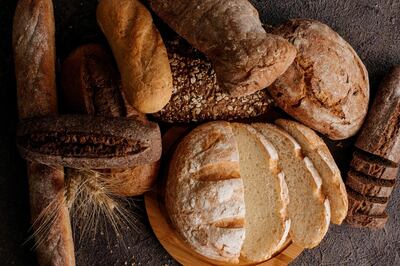
There are some theories that suggest the human body can’t digest the quantities of gluten we consume in our modern-day diets, however more research is needed to confirm this, she adds. “Currently, the best way to know if one should avoid gluten is to first rule out Celiac disease or any other autoimmune disease that would benefit from a gluten-free diet and the next step is through trial and error and monitoring whether one suffers from any symptoms that may occur after gluten exposure.”
It’s important to remember that gluten-free foods are commonly less fortified with folic acid, iron and other nutrients than regular, gluten-containing foods, adds Aoun. They can also be more expensive.
“And gluten-free foods tend to have less fibre and more sugar and fat. Several studies have found a trend towards weight gain and obesity among those who follow a gluten-free diet.”
Fact or fiction? Celery juice helps decrease bloating
This is sort of true, says El Sabbagh. "This Instagram trend is growing by the day, but are there scientific facts to back up the benefits of celery juice? The answer is yes – and no.
"Celery is filled with fibre, potassium, folate and manganese. These are all very important nutrients for the body that can help with numerous ailments like inflammation, cholesterol, allergies and blood pressure."
But the trick is not to juice celery, she adds. "Juicing removes the fibres, which are essentially why we’re eating it. Have a celery whole, and it will benefit you a lot more."
